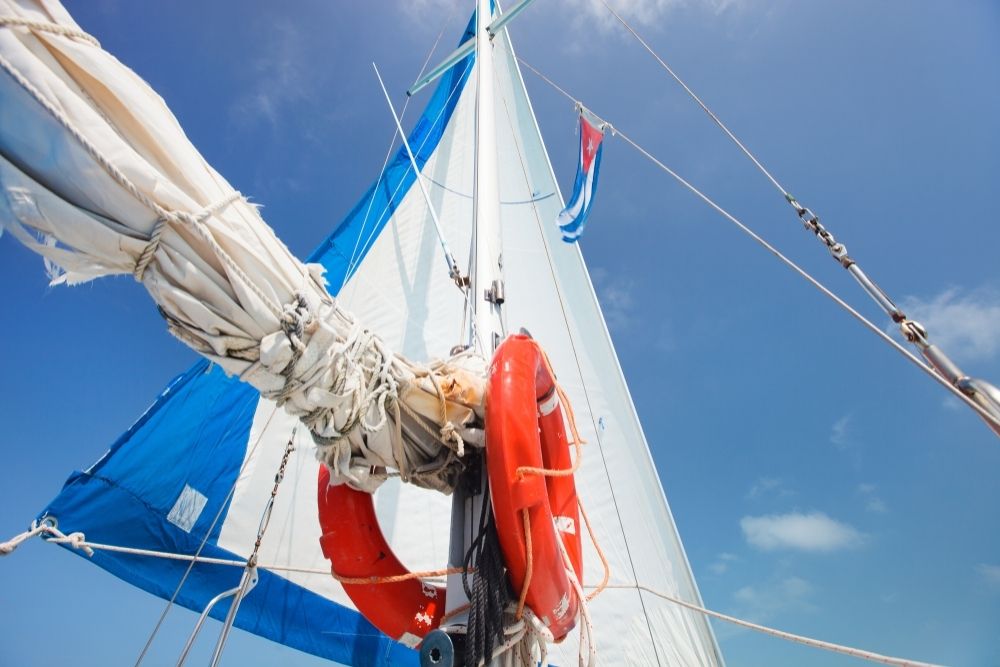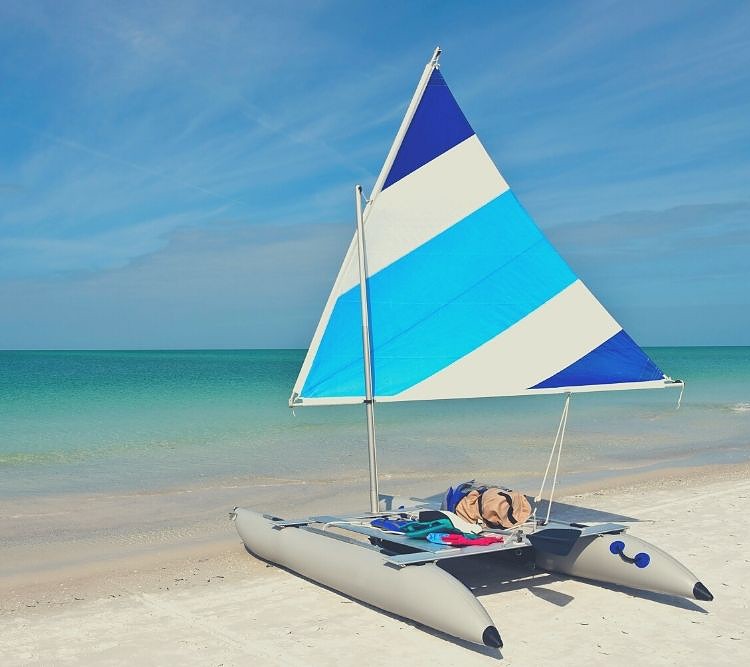Would you like to have the option to use a sail on your inflatable boat? Have you looked into buying a sailing rig for an inflatable boat but it’s too expensive?
Then you’re in luck because it’s not too hard to make your own sail and sailing rig for an inflatable boat. Here’s what you need to know to take on this project.
You can follow the directions below or see them outlined in the video below.
Note that this video makes a sail for a traditional boat. We have modified our instructions for inflatable versions.
Table of Contents
Materials
Here’s what you’ll need to buy to make a sail.
- At least 15 feet of 1” schedule 40 PVC (the exact length will be determined by the size of your boat)
- 1 (6 foot x 8 foot) ripstop tarp or nylon
- Powerful glue, like super glue or gorilla glue
- 2 1/2 feet of 1 1/2 inch schedule 40 PVC
- Parachute cord
- At least 4 eyelet screws
- 1 1” PVC elbow (90 degrees)
- 1 2×4
- 8” 2×6
- 4 3 ½” screws
- 1 old fishing pole
Making the Sail

- Start by cutting one 6 foot piece of PVC and one 12 inch piece of PVC. This is your mast.
- Connect these with an elbow joint.
- Lay out the tarp.
- Lay the connected pipes diagonally on the tarp with the unattached end of the 6-foot length of PVC approximately one foot from the corner of the tarp.
- Cut the tarp around the PVC, leaving about 6 inches of extra space on all sides.
- Make sure that there one of the tarp’s grommets is located in the free corner of the piece of tarp you are cutting.
- Wrap the tarp 1 to 1.5 times around the long piece of PVC and glue it in place.
- Wrap and glue the tarp over the 12-inch piece of PVC and the elbow joint, too.
- Cut one 4.5-foot piece of PVC to use as the boom.
- Use an old fishing rod as the bottom batten of the sail and glue the bottom of the sail around the same way you did, above.
- Use an eye bolt to connect the boom to the mast. You can place the pipe over the eyelet and tie it on, as well, for a reinforced connection.
- Drill holes in the pipe every 8-12 inches.
- Burn holes in the tarp at identical intervals along the bottom of the sail. You can heat a screwdriver with a lighter for this purpose.
- Thread parachute cord through the holes in the sail and the ones in the boom to connect the sail to the boom.
- Tie the tarp to the mast in places where it seems loose or like it might become so to reinforce it.
Making the Mast Holder

Here’s how to make a mast holder.
- Find two 2x4s and cut them to the proper length for your boat.
- Cut a hole in the center of a square piece of wood that is at least 2” thick.
- Mount the 2x4s onto the square piece as shown in the video.
- Cut a 12” piece of wider PVC and mount that in the hole in the center of the square piece.
- Pierce this with holes in 2 places. Screw eyelets into these holes. You will tighten these to keep your mast in place or loosen them to take it out and dismantle the sail.
- Place the mast into the wider piece of PVC.
- Screw an eyelet into the PVC underneath the square piece. This helps your sail sit at the right height.
Mounting the Sail

You will need to mount your sail in your boat differently depending on the type of inflatable boat you have. The instructions here are for an inflatable boat with a rigid floor.
- Determine where you want to mount the sail.
- Glue the base piece – the square piece from above – in this location.
- Use the larger 2x4s to lie across the bow of your boat to steady the sail.
- If your inflatable pontoons cannot support the weight of the 2x4s, replace them with long sections of PVC pipe. Connect these with bolts so that they are the right width for your sail to pass through.
Using the Sail

Making the sail is only the first step. Now, you have to learn how to use it. Here are some tips for using your new sail effectively.
Tie a long rope or paracord from the grommet on the bottom corner of your sail to your boat. This will help hold your sail in place so you don’t have to have your hands on it continuously.
When you want your sail to face another direction, simply untie this rope, move the sail, and tie it in place again.
Note that this sail is not attached to a rudder. While it will help you get where you want to go, it will not be as effective as some sails are because of this.
It is possible to add a rudder to your sail, but how to build that is beyond the scope of this article. You can find instructions online or play around with it yourself until you find something that works for you.
You can modify your sail as you get used to it and discover what you need. You may decide that you want a longer mast, a higher boom, or some other modifications. The benefit of making your own sail is that you can remake it whenever and however you want to.
Taking a sailing class could help you get the most out of your sail. Most marinas offer these and they cater to all age groups, from children to adults. You can spend a weekend learning to sail and then apply what you’ve learned to your own boat.
Conclusion
Now that you have a sail for your inflatable boat, it’s time to get out on the water and try it. Make sure you test your sail on a day with light wind, so you can get used to using it under optimal conditions.
As you get more confident with the sail, you should be able to do more and more with it. Eventually, you may not need to paddle your boat anymore!

I created this site to help people – to help you – with your boat problems. Instead of helping one person at a time, I want this website to be the “one-stop-shop” for everyone’s boating concerns. Read more.

